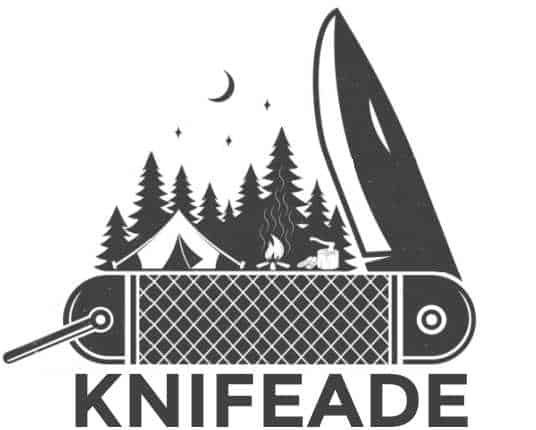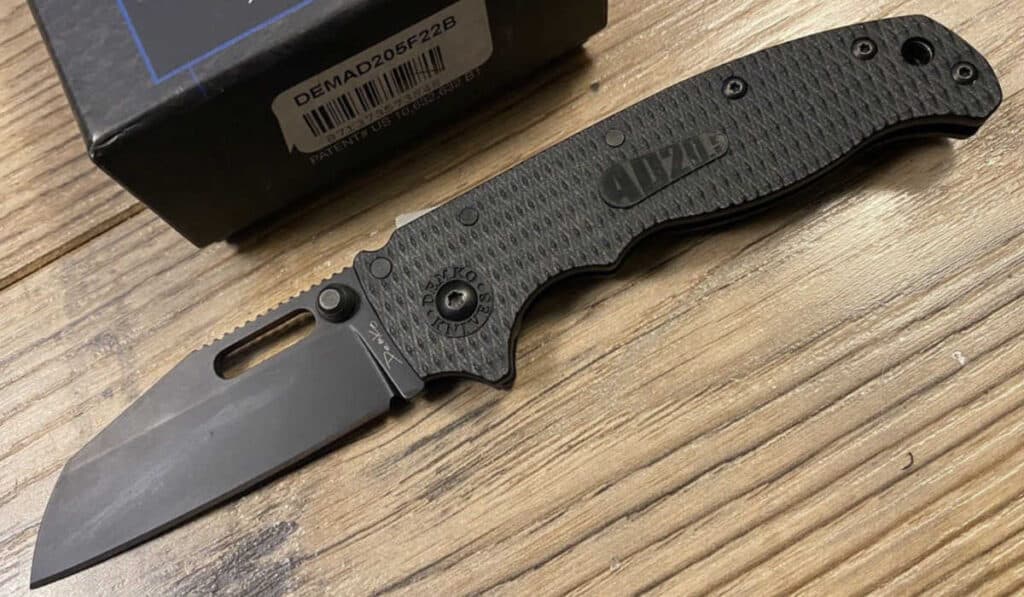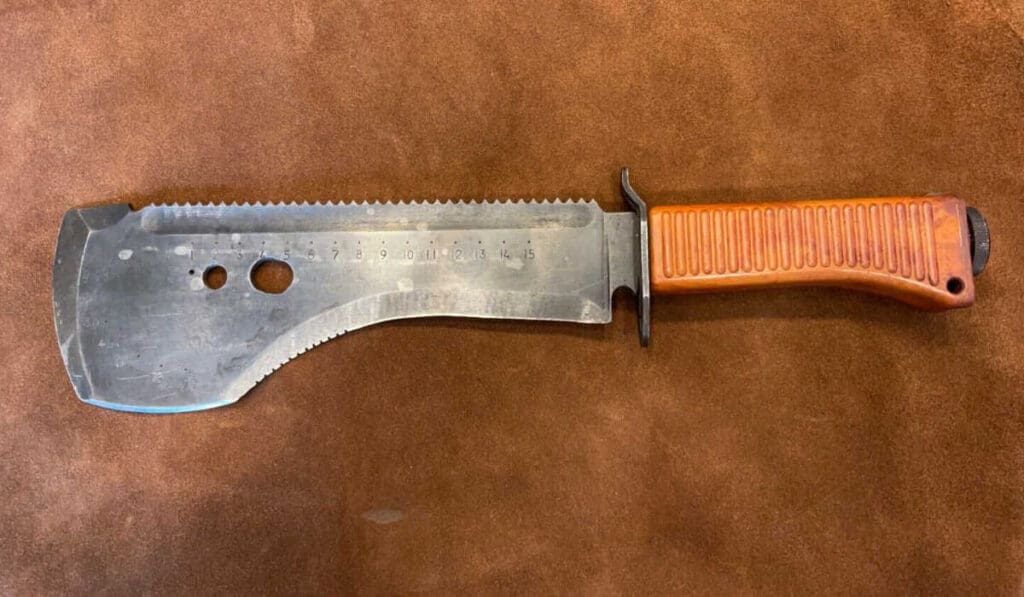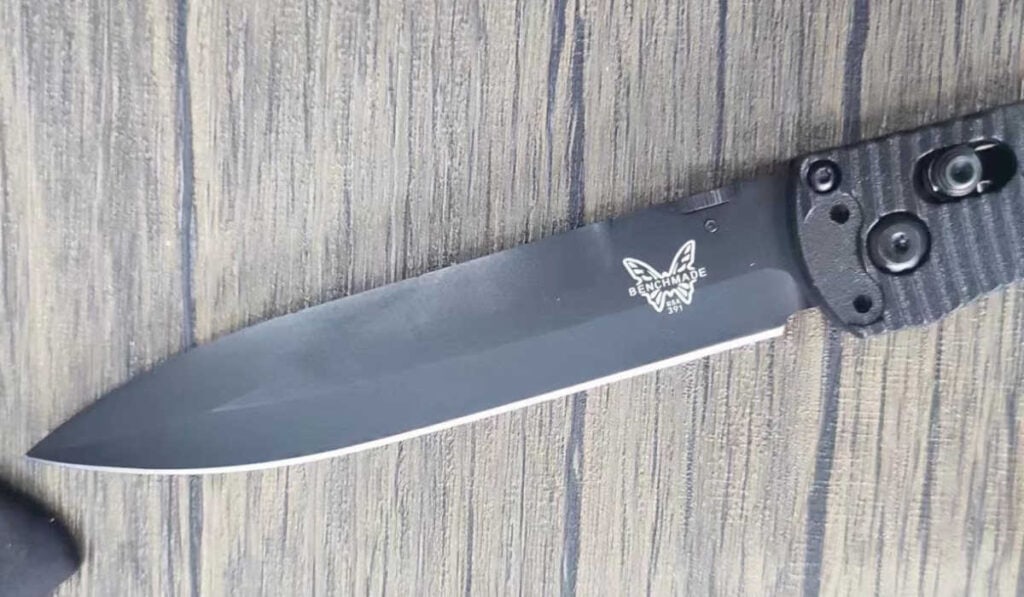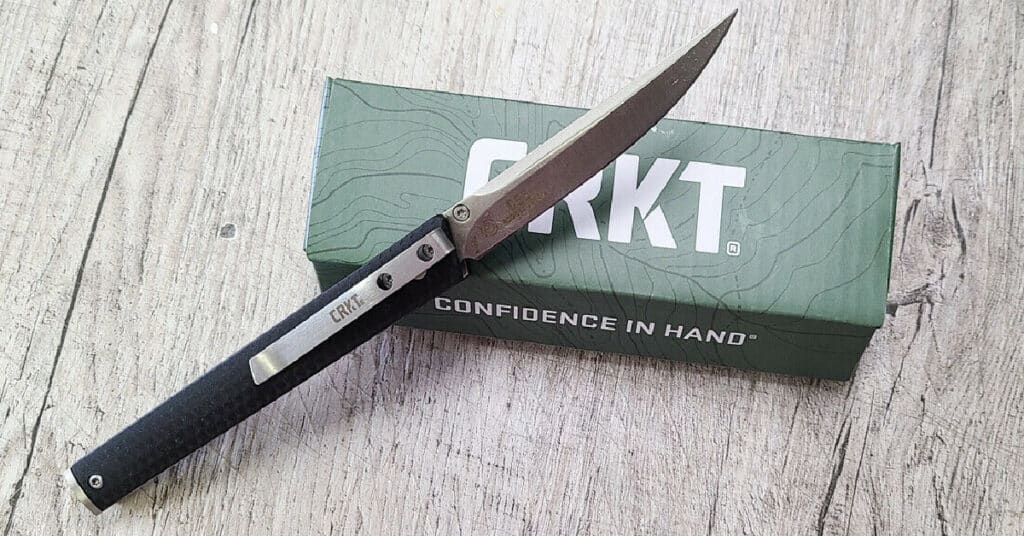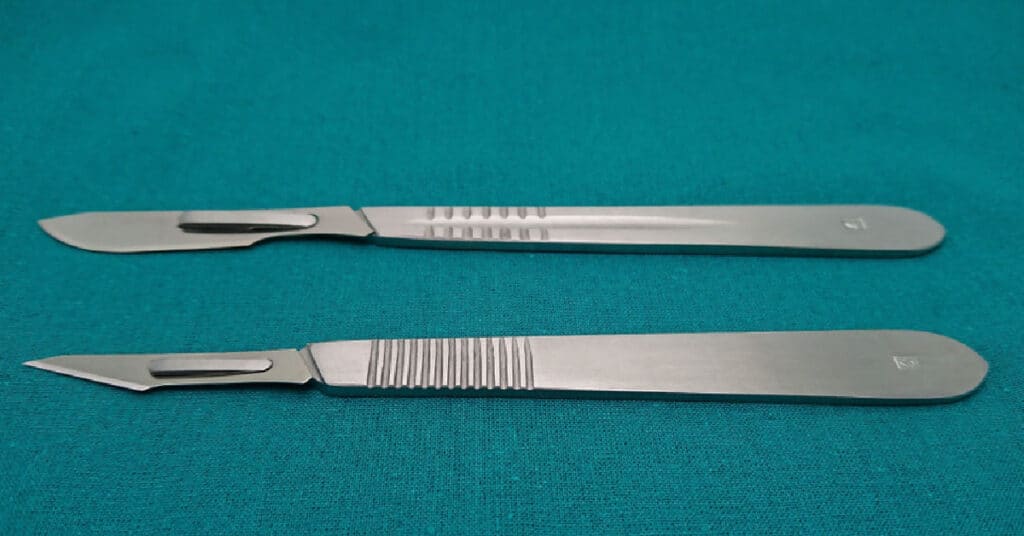Last updated on July 13th, 2023 at 02:32 pm
As an Amazon Associate I earn from qualifying purchases.
Las Vegas, the bustling city in Nevada known for its flashy nightlife and entertainment, is a popular destination for tourists and locals alike. While it may be known as the city of indulgence, it is essential to be aware of the regulations and laws governing everyday life, such as carrying a knife. In general, carrying a knife is legal in Las Vegas, but there are some crucial factors and exceptions to consider before you decide to arm yourself with one.
Nevada does not have a statewide preemption on knife laws, which means that the regulations can vary from one county to another. It is crucial to be familiar with the local ordinances in addition to the overarching state laws. This ensures that you avoid any legal trouble while being in possession of a knife, whether for personal or recreational purposes.
Open carry of knives is generally legal in Las Vegas, allowing any type of knife to be carried visibly, such as on a belt. However, specific locations impose restrictions on carrying knives. To avoid any criminal charges or penalties, it is advised to research the local laws before walking around with a knife in the city.
Nevada Knife Law
Nevada has specific knife laws that govern the type and size of knife you can carry in Las Vegas. In general, it is legal to carry a knife in public as long as the blade is shorter than four inches. However, there are some types of knives that are restricted, such as switchblades, stilettos, or balisong knives.
State knife laws in Nevada have a statewide preemption, meaning that local governments cannot pass more restrictive knife laws than the state laws. This ensures consistency of laws across the state. The state does allow concealed carry of some knives, but you must obtain a permit for certain types of knives.
There are a few exceptions to carrying knives in public areas. You may not carry any kind of knife within 25 feet of a protest or demonstration that occurs on public property or streets, with the exception of a folding knife with a blade length of three inches or shorter. Additionally, Nevada knife law also mandates that it is illegal to carry a dangerous knife, which is defined as a knife with a blade longer than two inches measured from the tip to the blunt end where it meets the handle.
In summary, while Nevada’s knife laws allow for the carrying of knives in public, there are some restrictions on the type of knives and the circumstances in which they can be carried.
Legally Permissible Knives
Our Top Rated “50-State-Legal” Knives
*These knives are listed based on their broad legality across states, but always consult your local laws before making a purchase.
In Las Vegas and the state of Nevada, carrying certain types of knives is legal, as long as the individual complies with specific regulations. It is crucial to understand these rules before deciding to carry a knife in public.
Firstly, pocket knives are generally legal to carry in Las Vegas. These knives are typically small and foldable, making them a popular choice for everyday use. However, always double-check local laws to ensure that carrying a pocket knife is allowed in the specific city or county where you plan on using it.
In Nevada, butterfly knives are considered legal, allowing residents and visitors to carry and use these particular types of knives. Although butterfly knives are considered dangerous due to their unique design, the state does not have a specific restriction against owning or carrying them.
Regarding other types of knives, it is generally permitted to open carry any kind of knife in Las Vegas. Open carrying a knife means that it is visible to others through ordinary observation, such as when it is attached to a belt. However, there may be certain locations, such as government buildings, that impose restrictions on carrying knives.
Although not a knife, it is worth noting that stun guns are also legal to possess and carry in Nevada for self-defense purposes. Stun guns are non-lethal weapons that can be used to deter potential threats but are subject to strict usage guidelines based on the circumstances and location.
In conclusion, knowing and adhering to the specific local laws surrounding knife and weapon carrying is paramount for staying within legal bounds.
Prohibited Knives
In Las Vegas, there are some restrictions on specific types of knives that you need to be aware of. While most knives are legal to carry and possess in Nevada, there are certain areas and situations where knives are not allowed. It’s essential to know these restrictions to avoid penalties and stay within the law.
Switchblades, dirks, daggers, automatic knives, spring-blade knives, snap-blade knives, and sword canes are generally allowed within the state. However, you should pay attention to the length of the blade. In Clark County, where Las Vegas is located, you need the sheriff’s permission to conceal carry a blade that is three inches or longer.
Local governments may enforce stricter rules on knife possession and carrying. It’s important to be aware that there is no statewide preemption in Nevada, meaning state law can differ per county. This means you should always check local laws before carrying any knife in a new area.
When attending a protest or demonstration in Las Vegas, you are not permitted to carry any kind of knife within 25 feet of the event, which occurs on public property or public streets. There is an exception for folding knives with a blade length of three inches or shorter.
Remember that schools, childcare facilities, and public universities have restrictions on possessing and carrying knives, so make sure to avoid bringing any knives to these locations.
As a rule of thumb, always check local laws and regulations before carrying a knife in Las Vegas or any other location within Nevada. By being well-informed and respecting the rules, you can confidently and legally possess knives in the state.
Carrying Knives in Las Vegas
In Nevada, carrying a knife is generally legal as long as the blade is shorter than four inches. However, there are certain types of knives that are prohibited. For example, it is illegal to carry a switchblade, stiletto, or balisong knife in public.
For those wondering about specific carry laws in Las Vegas, concealed carry of any knife is not allowed, regardless of blade length. On the other hand, open carry is typically allowed, except in certain locations. For instance, it is considered a misdemeanor to bring weapons, which presumably include knives, to any city park, recreational facility, public plaza, or any parking area that serves those facilities.
While there is no statewide limit on blade length, local counties may have different laws. Clark County, where Las Vegas is located, has specific regulations that make it illegal to conceal carry any knife with a blade longer than three inches.
It’s important to keep in mind that these laws apply to residents and visitors alike. When carrying a knife in Las Vegas, make sure to remain aware of the local regulations and exercise caution when in public spaces.
Concealed Carry of Knives
In Las Vegas, carrying a concealed knife with a blade three inches or longer is illegal without a valid and current knife-specific CCW (carrying concealed weapons) permit issued by a Nevada sheriff. Obtaining a CCW permit in Las Vegas involves following certain procedures and meeting requirements.
When considering carrying a concealed knife, it’s essential to be aware of the various types of knives that may require a CCW permit. For example, certain types of knives, like machetes, are unlawful to carry concealed on one’s person.
A key aspect to remember is that Nevada does not have state-wide preemption, which means that the state law regarding carrying concealed knives can differ per county. Thus, it’s crucial to verify the specific regulations in the county if you’re planning to carry a knife.
If you’re caught carrying a concealed knife without a CCW permit in Las Vegas, you may face penalties. These penalties could include fines or even jail time, depending on the severity of the offense and other circumstances surrounding the incident.
In summary, carrying a concealed knife in Las Vegas requires obtaining a CCW permit. Make sure to consider the type of knife, adhere to county-specific regulations, and be prepared for potential penalties if you fail to comply with the law.
Exceptions and Restricted Areas
In Las Vegas, it is generally legal to carry a knife, but there are certain exceptions and restricted areas to be aware of. For instance, carrying a knife with a blade of three inches or longer is not allowed without a Concealed Carry Weapon permit in Clark County, where Las Vegas is located.
Schools and Childcare Facilities
Carrying a knife on the premises of public schools, private schools, public universities, childcare facilities, and licensed childcare facilities is prohibited in Nevada. This restriction is in place to ensure the safety and security of students, faculty, and the general public. It is important to be aware of these limitations and regulations when considering carrying a knife in these sensitive locations.
Military Bases
Similar to educational and childcare sites, carrying a knife on a military base is typically forbidden. Military bases have strict security measures in place, and individuals found possessing a knife on the base may face severe penalties. It is essential to respect the rules and boundaries surrounding military bases and avoid bringing a knife onto the premises.
Overall, it is important to be knowledgeable about the local and state laws regarding knife possession and understand the exceptions and restrictions that apply in specific areas, such as educational facilities and military bases. Following these guidelines will help keep everyone safe and avoid potential legal issues.
Penalties for Violations
Carrying a concealed knife without a permit in Las Vegas can lead to serious legal consequences. For first-time offenders, this act is considered a gross misdemeanor, which can result in penalties of up to a year in jail and/or up to $2,000 in fines. A subsequent offense escalates the charge to a category D felony, carrying a punishment of one to four years in state prison and up to $5,000 in fines.
Las Vegas has specific restrictions on carrying knives in certain locations, regardless of your intent for self-defense. Violating these location restrictions can lead to misdemeanor charges. Such charges can result in up to six months in jail and/or up to $1,000 in fines.
It is crucial to note that some types of knives, such as dirks, daggers, and switchblades with blades longer than 2 inches, have additional location restrictions applied to them in Las Vegas. Carrying these types of knives in restricted locations could lead to criminal charges ranging from misdemeanors to category B felonies, with varying degrees of penalties.
In summary, it is essential for individuals to be aware of Las Vegas’ knife-carrying laws to avoid facing gross misdemeanor, misdemeanor, or felony charges. Penalties can include jail time and significant fines, with increased severity for subsequent offenses or the use of specific types of knives in restricted locations.
Legal Consequences
Carrying a knife in Las Vegas is generally legal, but there are specific exceptions to this rule which, if violated, could lead to serious penalties. For instance, it is illegal to possess a knife on school property, child care facilities, or public universities. Furthermore, local laws in Clark County, where Las Vegas is situated, require a permit from the sheriff if you want to conceal carry a blade that is three inches or longer.
Assault with a deadly weapon, such as a knife, can result in serious legal consequences. This can include bodily harm to another person, leading to potential charges of assault or battery depending on the extent of the injuries inflicted. In Nevada, significant cutting or stabbing injuries produced by a knife may lead to the assailant facing severe penalties, including imprisonment and fines.
Brandishing a knife in a rude, angry, or threatening manner is also illegal under Nevada law. Even without causing any bodily harm, simply drawing a knife with the intent to threaten or intimidate someone can lead to charges, and ultimately penalties ranging from fines to imprisonment. It is crucial to avoid engaging in any such behavior with a knife, regardless of any perceived provocation.
It is important to note that while the general state law does not impose restrictions on the open or concealed carry of knives, some locations in Las Vegas, such as city parks or recreational facilities, have specific rules prohibiting the possession of weapons, including knives. Violation of these local ordinances may lead to misdemeanor charges and potential penalties like fines or jail time.
Remember to always be aware of local laws and regulations concerning knives to avoid any unintended legal consequences. Carrying a knife is a serious responsibility, and adhering to the relevant laws will help ensure a safe and lawful experience.
Law Enforcement and Knife Laws
In Las Vegas, knife laws are primarily enforced by the Las Vegas Metropolitan Police Department (LVMPD) and the Clark County Sheriff’s Office. These law enforcement agencies work together to ensure public safety and compliance with state and local regulations regarding the possession and carrying of knives.
Knife laws in Nevada are relatively lenient, allowing for the open carry of most types of knives. However, certain restrictions do apply, such as the prohibition of carrying any kind of knife within 25 feet of a protest or demonstration on public property or public streets, with an exception for folding knives with a blade length of three inches or shorter. Violating this restriction is considered a misdemeanor punishable by up to 6 months in jail and/or up to $1,000 in fines.
Law enforcement officers, including those from the LVMPD and Clark County Sheriff’s Office, have the authority to check for compliance with these knife laws during routine stops, searches, and arrests. Peace officers are trained to identify illegal knives and take appropriate enforcement actions when necessary.
It is essential for residents and visitors in Las Vegas to be aware of and abide by the knife laws. Familiarizing yourself with the local regulations can help prevent encounters with law enforcement officers and any potential legal consequences. Ultimately, the goal is to ensure a safe environment for everyone in the community.
Federal and Local Laws
In Nevada, there are no forbidden knives under state law. However, concealment restrictions apply to machetes, and location restrictions apply to dirks, daggers, and any switchblade knife with a blade longer than 2 inches. It’s essential to be aware of these restrictions, as carrying a knife in certain situations can lead to legal trouble.
Local municipalities can have stricter knife laws, varying from one city or town to another. In Las Vegas, for instance, you may not carry any kind of knife within 25 feet of a protest or demonstration on public property or public streets, with the exception of a folding knife with a blade length of three inches or shorter. Violating this rule can result in a misdemeanor charge, punishable by up to 6 months in jail and/or up to $1,000 in fines.
Federal law also plays a role in knife regulations. The Federal Switchblade Act prohibits the manufacture, importation, distribution, and sale of switchblades across state lines. However, the law does not apply to collectors or possessors of switchblade knives.
Statewide preemption is a concept that prevents local municipalities from enacting laws that are more restrictive than state law. While Nevada has some preemption in place regarding firearms, it does not extend to knife laws. This means that local jurisdictions are free to impose additional restrictions on knife possession and use.
It is important to note that the right to keep and bear arms, as protected by the Second Amendment of the US Constitution, does not encompass all types of weapons. Courts have held that this right does not extend to unusually dangerous weapons, such as certain types of knives. Therefore, restrictions on knives are generally not considered a violation of constitutional rights.
In conclusion, while carrying a knife is generally legal in Nevada, specific federal and local laws impose limits on the type, location, and circumstances under which a knife may be carried. To avoid legal trouble, it’s crucial to be knowledgeable about and abide by these regulations.
Other Related Weapons
In addition to the knife laws in Las Vegas, there are also regulations governing other types of weapons. Firearms, for instance, are subject to certain restrictions. In Nevada, open carry of a handgun is legal without a permit, but concealed carry requires a valid Concealed Carry Weapons (CCW) permit.
Regarding other types of weapons, Nevada law prohibits the possession of brass knuckles, blackjacks, and billies, as they are considered dangerous or deadly weapons. Carrying these items can lead to criminal charges and penalties.
While metal detectors are not classified as weapons, their use is subject to specific regulations. For example, individuals need permission from property owners or local authorities before using metal detectors in public parks or historical sites.
In summary, when considering the carry and use of weapons in Las Vegas, it is essential to be aware of the legal regulations that apply to knives, firearms, and other related items. Familiarizing yourself with these laws can help ensure compliance and avoid potential legal trouble.
Do Sheepsfoot Blades Have A Purpose? (Cuz They’re Ugly…)
Spetsnaz Machetes – Blades Of The Russian Special Forces
What Is The Actual Purpose Of A Spear Point Knife Blade?
CRKT CEO Review – Coolest, Most Worthless Knife Ever?
How Sharp Is A Scalpel? (Is It Sharper Than A Razor?)
Can You Shave With A Knife? (Yes, Here’s How)
As an Amazon Associate I earn from qualifying purchases.
